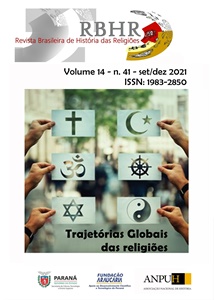Spirits beyond Meaning
Transference of historical experience in Umbanda in German-speaking Europe
Resumo
In this paper, we introduce the two German speaking Umbanda communities of the Casa St. Michael, House of Pure Water under the spiritual leadership of Mãe Gabriele and the Ilê Axé Oxum Abalô, Terra Sagrada under the spiritual guidance of Mãe Habiba and their placement in the European therapeutic scene as a way to explore the argument that beyond cultural adaptations and the correctness of symbolic content, a particularly Brazilian social experience is being transmitted to Europe in Umbanda rituals that lies beyond meaning. Its meaning is rather anchored in the very core of the ritual practice in its emphasis on marginalized figures and trance, reminding the European practitioners of the repressions of the colonial era und urge them to decolonize their thinking through Umbandist religious practice of the spirits of the Pretas Velhas and Pretos Velhos as spiritual personifications of old slaves and the Caboclas and Caboclos as indigenous spirits that evoke the collective trauma of violence against Africans and indigenous people in Brazil. As Umbanda triggers particular social experiences, we refer our insights on McLuhman’s argument that “the medium is the message”.
Downloads
Referências
APPADURAI, Arjun. „Graswurzelglobalisierung im Zeitalter des Ideozids“. In: Ders.: Die Geographie des Zorns. Frankfurt a.M.: Suhrkamp, 2009[2006], p. 133-156.
ARAKAKI, Ushi. “Japanese-Brazilians Among Pretos Velhos, Caboclos, Buddhist Monks, and Samurais: An Ethnographic Study of Umbanda in Japan”. In: Rocha, Cristina / Vásquez, Manuel (org.): The Diaspora of Brazilian Religions. Leiden: Brill, 2013, p. 249-270.
BAHIA, Joana. “Religiosidad afro brasileño en Berlín: A daptaciones en la transnacionalización del candomblé”. Sociedad y Discurso , vol. 28, 2015, p. 7-25.
BODE, Sabine. Kriegsenkel. Die Erben der vergessenen Generation. Stuttgart, 2014.
CSORDAS, Thomas (ed.). Transnational Transcendence. Essays on Religion and Globalization. Berkeley, 2009.
DINER, Dan. Zivilisationsbruch. Denken nach Ausschwitz. Frankfurt a.M., 1988.
ESPÍRITO SANTO, Diana. “Clothes for Spirits: Opening and Closing the Cosmos in Brazilian Umbanda” [online]. In: Hau, Journal of Ethnographic theory, vol. 6, No 3, 2016. https://www.haujournal.org/index.php/hau/article/view/hau6.3.010.
GONÇALVES DA SILVA, Vagner. O Antropólogo e sua Magia. São Paulo, 2000.
HALLOY, Arnaud. Dieux en Exil. Adaptations et apprentissage rituel dans un candomblé de caboclo en Belgique. Doctoral thesis, 2000.
HABERMAS, Jürgen. „Die Krise des Wohlfahrtsstaates und die Erschöpfung utopischer Energie“. In: Ders.: Die neue Unübersichtlichkeit. Frankfurt a.M., 1985.
HAUSBERGER, Bernd (Hg.). Globale Lebensläufe. Menschen als Akteure im weltgeschichtlichen Geschehen. Vienna, 2006.
HEINRICHS, Thomas. „Schluss mit der staatlichen Bevorteilung der Religionen“. [online], https://humanistisch.de/x/hvd-bb/presse/2018063166, publiziert am 7.6.2018, retrieved from 16.8.2019.
KRESZMEIER, Astrid Habiba. Systemische Naturtherapie. Heidelberg, 2008.
KRESZMEIER, Astrid Habiba HUFENUS, Hans-Peter. „Nature & Healing“ [online], https://www.nature-and-healing.ch, retrieved from 12.2.2019.
LENSER, Farah (2009): „Rituelle Wege zu anderen Dimensionen des Bewusstseins“. Berlin: Ab 40, Nr. 3, 59-64.
MARCUS, George. Ethnography in/of the World System: The Emergence of Multi-Sited Ethnography. Annual Review of Anthropology, 1995, vol. 24, p-95-117.
MCLUHMAN, Marshal. “The Medium is the Message”. In Understanding media: the extensions of man, 1964.
MEYER-LEGRAND, Ingrid. Die Kraft der Kriegsenkel. Wie Kriegsenkel heute ihr biographisches Erbe erkennen und nutzen. Berlin, 2016.
MONTEIRO, Paula. Imaginary and Pretos Velhos - Adaptation of a Brazilian Symbol in European Contexts. Studia Religiologica, vol. 51, no 3, 2018.
RAUNITSCHKA, Kathrin. “Team: Kathrin Raunitschka” [online], http://www.natur-und-ritual.de/team/kathrin-raunitschka, retrieved from 15.8.2019.
ROCHA, Cristina / VÁSQUEZ, Manuel (org.). The Diaspora of Brazilian Religions. Leiden: Brill, 2013.
RÖMHILD, Regina. „Aus der Perspektive der Migration. Die Kosmopolitisierung Europas“. In: Hess, Sabine / Binder, Jana / Moser, Johannes (Ed.): No Integration?! Kulturwissenschaftliche Beiträge zur Integrationsdebatte in Europa. Bielefeld, 2009, p. 225-238.
SCHARF DA SILVA, Inga. Umbanda. Eine Religion zwischen Candomblé und Kardezismus. Über Synkretismus im städtischen Alltag Brasiliens, Berlin, 2017 [2004].
SCHARF DA SILVA, Inga. Trauma als Wissensarchiv. Postkoloniale Erinnerungspraxis in der Sakralen Globalisierung am Beispiel der zeitgenössischen Umbanda im deutschsprachigen Europa, Berlin, 2021 [in process of publication].
SJORSLEV, Inger. “Possession espiritual como tecnologia de la socialidad: sujetos y objectos en el candomble brasileño”. In: Murrey et al. (Ed.): Tecnología en los márgenes: Antropología, mundos materiales y técnicas en América Latina (Heterotopías nº 4), 2015.
VILAS BOAS CONCONE, Maria Helena. Umbanda. Uma religião brasileira. São Paulo, 1987.
Copyright (c) 2021 Inga Scharf da Silva, Marcello Múscari (Autor)

This work is licensed under a Creative Commons Attribution-NonCommercial-NoDerivatives 4.0 International License.
DECLARAÇÃO DE ORIGINALIDADE E DIREITOS AUTORAIS
Declaro que o presente artigo é original, não tendo sido submetido à publicação em qualquer outro periódico nacional ou internacional, quer seja em parte ou em sua totalidade.
Os direitos autorais pertencem exclusivamente aos autores. Os direitos de licenciamento utilizados pelo periódico é a licença Creative Commons Attribution 3.0 (CC BY 3.0): são permitidos o acompartilhamento (cópia e distribuição do material em qualqer meio ou formato) e adaptação (remix, transformação e criação de material a partir do conteúdo assim licenciado para quaisquer fins, inclusive comerciais.
Recomenda-se a leitura desse link para maiores informações sobre o tema: fornecimento de créditos e referências de forma correta, entre outros detalhes cruciais para uso adequado do material licenciado.







